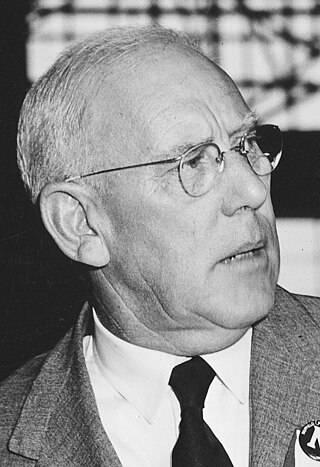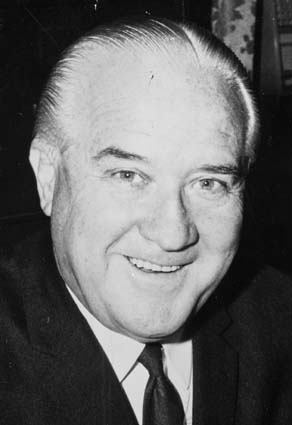
Reginald Francis Xavier Connor was an Australian politician who served as a member of the House of Representatives from 1963 until he died in 1977, representing the Labor Party. He was the Minister for Minerals and Energy in the Whitlam government from 1972 to 1975.
Illawarra was an electoral district of the Legislative Assembly in the Australian state of New South Wales. It was located in the Illawarra area and originally created in 1859, replacing East Camden. It was replaced by Wollongong in 1904 and recreated in 1927. In 1968, it was abolished and partly replaced by Kembla. In 1971, Kembla was abolished and Illawarra was recreated. In 2007, it was abolished and replaced by Shellharbour.
Wollongong is an electoral district of the Legislative Assembly in the Australian state of New South Wales. It is represented by Paul Scully of the Labor Party. Since a redistribution in 2013, it has covered an area of 79.25 square kilometres and includes the localities of Berkeley, Coachwood Park, Coniston, Cordeaux Heights, Corrimal, Cringila, Fairy Meadow, Farmborough Chase, Farmborough Heights, Figtree, Gwynneville, Kembla Grange, Kembla Heights, Kemblawarra, Lake Heights, Lindsay Heights, Mangerton, Mount Kembla, Mount Saint Thomas, North Wollongong, Port Kembla, Primbee, Spring Hill, Towradgi, Unanderra, Warrawong, West Wollongong, Windang, Wollongong.
Francis Neville (Frank) Arkell was an Australian politician. Arkell was a long-serving Lord Mayor of Wollongong and an independent member of the New South Wales Legislative Assembly, representing Wollongong. In 1998, at the age of 62, Arkell was violently murdered in his home by Mark Valera. At the time of his death, he was under police investigation for child sex offences. Continued investigation largely cleared Arkell of wrongdoing, with police concluding that a tape that supposedly recorded Arkell making sexual advances to a teenager had in fact been faked by former Wollongong mayor and pedophile Tony Bevan as blackmail. Arkell was a Knight of the Order of the Star of Italy, according to his biography on the Parliament of NSW site.
Wollongong-Kembla was an electoral district of the Legislative Assembly in the Australian state of New South Wales. It was created in 1941 and abolished in 1968, being split into Wollongong and Kembla.
Kembla was an electoral district of the Legislative Assembly in the Australian State of New South Wales for a single term from 1968 to 1971, named after the Mount Kembla or Port Kembla. It replaced part of Wollongong-Kembla and Illawarra and was replaced by Illawarra. Its only member was George Petersen.
Members of the New South Wales Legislative Assembly who served in the 40th parliament held their seats from 1962 to 1965. They were elected at the 1962 state election, and at by-elections. The Speaker was Ray Maher.
Members of the New South Wales Legislative Assembly who served in the 35th parliament held their seats from 1947 to 1950. They were elected at the 1947 state election, and at by-elections. The Speaker was Bill Lamb.
John Cameron Books was an Australian politician. He was the Liberal member for Parramatta in the New South Wales Legislative Assembly from 1988 to 1991.
Howard Thomas Fowles was an Australian politician. He was a member of the New South Wales Legislative Assembly from 1941 until 1968 and a member of the Labor Party (ALP). He was the acting Speaker of the New South Wales Legislative Assembly for 3 months in 1962.

The 1950 New South Wales state election was held on 17 June 1950. It was conducted in single member constituencies with compulsory preferential voting and was held on boundaries created at a 1949 redistribution. The election was for all of the 94 seats in the Legislative Assembly, which was an increase of 4 seats since the previous election.
Douglas Elliott Porter was an Australian politician. He was a Labor Party member of the New South Wales Legislative Assembly from 1964 to 1965, representing the electorate of Wollongong-Kembla.
Arthur Redvers Baden Powell was an Australian politician and a member of the New South Wales Legislative Assembly for 3 months in 1950. He was a member of the Labor Party.

Michael William "Jack" Hough was an Australian politician. He was a Liberal member of the New South Wales Legislative Assembly, representing Wollongong-Kembla from 1965 to 1968 and Wollongong from 1968 to 1971.

Andrew Augustus Lysaght was an Australian politician. He was a Labor Party member of the New South Wales Legislative Assembly from 1925 until 1933, representing the electorate of Bulli. He served as Attorney-General of New South Wales under Jack Lang in 1927 and 1930-31.

The 1968 New South Wales state election was held on 24 February 1968. It was conducted in single member constituencies with compulsory preferential voting and was held on boundaries created at a 1966 redistribution. The election was for all of the 94 seats in the Legislative Assembly. The Liberal Party, led by Premier Robert Askin, in Coalition with the Country Party of Deputy Premier Charles Cutler, was elected for a second term—the first time that a non-Labor government had been reelected since before World War II.
Wollongong, an electoral district of the Legislative Assembly in the Australian state of New South Wales, has had three incarnations, the first from 1904 to 1920, the second from 1927 to 1930, and the third from 1968 to the present.
Wollongong-Kembla, an electoral district of the Legislative Assembly in the Australian state of New South Wales was created in 1941 and abolished in 1968.
A by-election was held for the New South Wales Legislative Assembly electorate of Concord on 11 February 1950 because of the death of Brice Mutton (Liberal).
A by-election was held for the New South Wales Legislative Assembly electorate of Wollongong-Kembla on 11 February 1950 because of the resignation of Billy Davies (Labor) to successfully contest the federal seat of Cunningham at the 1949 election.




